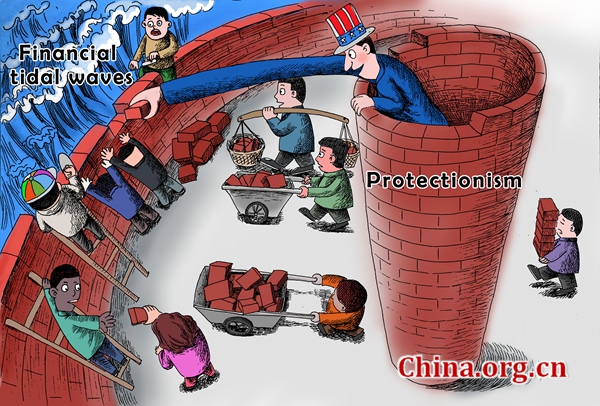Protectionism is not the road to riches
china.org.cn / chinagate.cn by Curtis Stone, March 16, 2017 Adjust font size:
|
|
|
Protectionism [By Zhang Xueshi / China.org.cn] |
Reorienting trade policy has become one of the main goals of the Trump Administration, according to the 2017 Trade Policy Agenda and 2016 Annual Report of the President of the United States on the Trade Agreements Program, a congressional report released by the Office of the U.S. Trade Representative on March 1. The Agenda lays out an aggressive trade policy that largely blames America's ills on trade deficits due to unfair trade.
Based on the premise that the U.S. has been put at an unfair disadvantage in global markets, Trump's new trade policy seeks to defend American sovereignty, enforce U.S. trade laws, use American leverage to open foreign markets, and negotiate new America-first trade agreements.
A major theme in the new trade policy is concern about the U.S. trade deficit. The Administration believes that the U.S. is losing at trade, and points to trade deficits as the evidence. In particular, the Administration is focused on the trade deficit with America's largest and most important trading partner -- China. In fact, the trade balance between the two countries has shown improvements and it will likely correct itself under normal market forces.
The trade balance is not some scorecard that evaluates economic strength in the China-U.S. relationship. In the current global trading system, China is not "winning" and the U.S. is not "losing" at trade, because both sides benefit from the trade relationship, even if the balance is uneven. For instance, a report earlier this year found that roughly 2.6 million jobs in the U.S. are supported by the China-U.S. economic relationship.
No doubt, China's emergence as a great economic power has certainly changed the pattern of international trade, but China's rapid growth did not kill the American Dream -- if anything, China's rapid growth has helped millions of Americans realize their dream. Enhanced cooperation between the two countries is a win-win for both sides.
An aggressive trade policy will only make America's ills worse. Any form of protectionism could hamper Trump's plans to rebuild America by making cooperation between the world's two largest economies more difficult and by increasing the likelihoodof a trade war.
China is not to blame for America's ills, nor is it a boogeyman we must fear. Days after the new trade policy was released, Peter Navarro, director of the White House's National Trade Council and a fierce China critic, explored the question of why trade deficits matter in an op-ed for The Wall Street Journal. Without mentioning China by name, he warned of the danger of having a trade deficit with "a rapidly militarizing strategic rival intent on world hegemony" seeking to "conquer by purchase."
His alarmist political rhetoric casts China as an emerging rival bent on world domination, but reality is different. China strives to build a community of shared future and has clearly stated its intention to remain committed to the path of peaceful development.
Pointing the finger at globalization will not fix America's ills. Rather than try to turn back the trend of globalization in some futile bid for greatness, the Trump Administration should fully seize the historic opportunity presented by a changing world system, and work hand in hand with the global community to improve the current global trading system. The common goal should be to make all countries great, not just America.
Curtis Stone is an editor and columnist based in Beijing, China. His work focuses on China-U.S. relations.
Opinion articles reflect the views of their authors, not necessarily those of China.org.cn.
